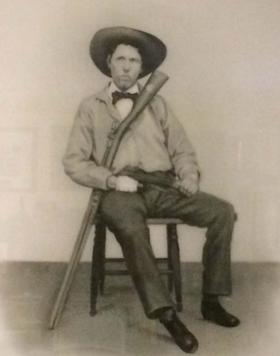Jack Sumner facts for kids
John Colton Sumner (1840–1907) was an American explorer. He was a key member of the Powell Geographic Expedition of 1869. This expedition explored the Grand Canyon by boat. Sumner was a skilled marksman and boatman. John Wesley Powell chose him to lead the first boat. Later, Sumner and Powell disagreed. Sumner was also deeply affected by the disappearance of three other men from the expedition.
Early Life and Military Service
John Colton Sumner was born on May 16, 1840. He grew up on a farm in Muscatine, Iowa, with his seven brothers and sisters. John loved to read, but farming was not his favorite activity.
During the American Civil War, he joined the Union Army. He became a corporal and a sharpshooter. He fought in important battles like Vicksburg and Nashville. In 1864, during the Battle of Pleasant Hill, an exploding shell caused serious injuries to his legs and hips. A piece of the shell also hit his head. He recovered, but he had headaches for the rest of his life.
When he was 26, Sumner moved to the Middle Park Basin in Colorado. He built a small trading post there. It was a two-room log cabin overlooking what is now the Colorado River. He traded with trappers and the Ute people. A year later, John Wesley Powell met Sumner while traveling the river. Powell asked Sumner to join his expedition to explore the Grand Canyon.
The Grand Canyon Expedition
In 1869, John Colton Sumner was 29 years old. He became Powell's main helper for the Grand Canyon expedition. The journey began on May 24 at 1 p.m. Ten men traveled in four wooden boats. Sumner, Powell, and Bill Dunn were in the lead boat, called the Emma Dean. Sumner wrote a daily journal about their trip.
On June 8, an accident happened on the Green River. One boat, the No Name, hit rocks in a rapid. The boat was destroyed, and they lost food and tools. Sumner quickly rescued the three men from that boat. He helped each of them grab onto his boat. Later, a newspaper wrongly reported that the whole expedition had drowned. It said Sumner was the only survivor.
On August 28, a sad event occurred. The rapids were getting harder to pass. Food was also running low. Three men, Bill Dunn and the brothers Oramel and Seneca Howland, decided to leave. They planned to climb out of the canyon. They hoped to walk to a nearby Mormon settlement. Sadly, they disappeared and were never seen again by the expedition. Sumner was very upset. He wished he had convinced them to stay with the group.
Life After the Expedition
After the expedition, Powell and Sumner respected each other. Powell even sent Sumner a special watch as a gift. However, their friendship did not last. Powell became very famous, but Sumner received little money or recognition. Sumner felt he did not get enough credit for his hard work. He believed Powell took too much credit for himself. Sumner also continued to worry about the three men who disappeared.
Sumner had financial difficulties. He struggled to earn enough money to return home to Grand Junction, Colorado. He worked as a trapper and prospector. He built up debts, which made it hard for his family to keep their farm. He married Alcinda, but they divorced in 1884. They remarried eighteen months later. Sumner preferred a simple life on the frontier. He was known locally as a true frontiersman.
When Powell died in 1902, Sumner wrote a letter to The Denver Post. He shared his feelings about the expedition. He believed Powell had made mistakes and had not been honest in his stories about the trip.
John Colton Sumner died in 1907 in Vernal, Utah. He faced financial struggles until the end of his life.
 | Calvin Brent |
 | Walter T. Bailey |
 | Martha Cassell Thompson |
 | Alberta Jeannette Cassell |


